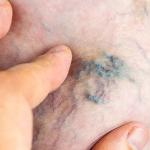
Chronic venous insufficiency (CVI) is a common yet often overlooked condition that affects how blood flows through the veins in your legs. When the tiny valves inside your veins become weak or damaged, they can’t efficiently push blood back toward the heart. Instead, blood pools in the lower limbs, leading to uncomfortable symptoms and, over time, worsening complications.
Recognizing the early signs of CVI and seeking an accurate diagnosis can help you avoid long-term issues like varicose veins, skin changes, and venous ulcers. At USA Vein Clinics, our specialists are trained to detect and treat CVI using advanced diagnostic techniques and minimally invasive treatment options, all in an outpatient setting.
How Chronic Venous Insufficiency Is Diagnosed
USA Vein Clinics experts begin with a comprehensive medical evaluation. During your consultation, one of our experienced vein specialists will review your symptoms, health history, and lifestyle factors. If CVI is suspected, the next step is typically a vascular ultrasound.
This non-invasive imaging test uses sound waves to map blood flow in your legs. It allows our team to identify malfunctioning valves, detect any blockages, and assess the overall health of your venous system. Vascular ultrasound is considered the gold standard in CVI diagnosis and helps us determine the most effective treatment plan for your needs.
Schedule a Diagnostic Ultrasound Today
Other Diagnostic Tools for CVI
While vascular ultrasound is the gold standard for diagnosing CVI, other methods—such as air plethysmography or photoplethysmography—may be used in some clinical settings to assess vein function. These tests measure how well blood returns from the legs but are typically used alongside or as a supplement to ultrasound, not as standalone diagnostics.
Recognizing the Symptoms
CVI symptoms often start gradually and may be mistaken for normal fatigue or aging. Some of the most common symptoms include:
- Leg heaviness or fatigue
- Swelling in the lower legs or ankles
- Aching or throbbing sensations
- Visible varicose or spider veins
- Skin discoloration or thickening
- Restlessness, especially at night
- Open sores or ulcers around the ankles
If you notice these symptoms persisting or worsening over time, it may be time to speak with a vein specialist.
When to Talk to a Specialist
If CVI symptoms are ongoing, especially if you have a family history of vein disease or spend long hours standing or sitting, it’s worth seeking professional evaluation. Left untreated, CVI can lead to serious complications over time, including skin discoloration, thickening of the skin, and painful, slow-healing venous ulcers.
In some cases, it can also increase your risk of developing deep vein thrombosis (DVT), a condition where blood clots form in the deep veins of the legs. If a clot travels to the lungs, it can cause life-threatening pulmonary embolism (PE). Early diagnosis and treatment of CVI can help prevent these potentially severe outcomes and support your long-term vascular health.
How USA Vein Clinics Can Help
With locations across the country and a network of trusted specialists, USA Vein Clinics is a national leader in vein care. We treat hundreds of thousands of patients every year using the latest in non-surgical, outpatient techniques. Our team uses vascular ultrasound to accurately diagnose CVI and build a treatment plan based on your symptoms and lifestyle.
From your first consultation to your final follow-up, we prioritize comfort, safety, and lasting relief that helps you take control of your vein health.
Treatment Options for CVI
Once CVI is diagnosed, the goal is to restore healthy blood flow and relieve symptoms. USA Vein Clinics offers minimally invasive treatments performed in an outpatient setting. These procedures are FDA-approved, require no general anesthesia, and allow for a shorter recovery period compared to more invasive procedures.
Common CVI treatments include:
- Endovenous Laser Therapy (EVLT): Uses laser energy to close diseased veins
- Ultrasound-Guided Sclerotherapy: Injects a solution into the vein to collapse and seal it
- Radiofrequency Ablation (RFA): Delivers heat to close off affected veins
- Varithena® Foam Treatment: A specialized foam designed to treat larger varicose veins
Each treatment is selected based on the severity of your condition and is designed to improve circulation, relieve symptoms, and reduce the risk of future complications.
If you’re concerned about leg discomfort or changes in your vein health, schedule a consultation with USA Vein Clinics to explore your options. Early detection is an important step in finding long-term relief from uncomfortable and painful vein symptoms.





